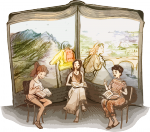Personal journeys lie behind the Hollywood hype for memoirs “Eat, Pray, Love” and “Wild.”
Before their major motion picture adaptations came the life stories of authors Elizabeth Gilbert and Cheryl Strayed. These stories were explored Sunday evening at Royce Hall during a panel discussion organized by UCLA’s Center for the Art of Performance as a part of their “Words and Ideas” speaker series. Gilbert and Strayed discussed both the personal struggles that drove them to write their books and their respective experiences of trying to convey their journeys in their works. The director of education and special initiatives at CAP, Meryl Friedman, said she wanted the conversation between the authors to grow organically, and for them to have an intimate conversation with the audience.
“They were allowed to have a conversation about anything that struck them,” Friedman said prior to the event. “What they choose to talk about is up to them in the context of the public conversation.”
CAP chose Gilbert and Strayed as guests partly because both of their stories were idealized and romanticized in the process of being turned into movies, Friedman said. She thought it would be resonant and interesting for the audience to learn firsthand about the raw forms of the life events that the films were based on because, too often, readers and viewers feel personally acquainted with artists.
Gilbert and Strayed began the panel by discussing how they first read each other’s works. Strayed described being on vacation with her husband when she first read “Eat, Pray, Love,” and Gilbert recalled comparisons of her book to Strayed’s memoir “Wild” when it was first released. They remarked that as soon as “Wild” was published, critics and publishers tried to set their books into competition with each other rather than healthy comparison. But Strayed identified the fundamental similarity between the two works – a physical journey.
Graduate screenwriting student Christina Borg said it was exciting to see two women supporting each other and providing insights during the panel. Borg commented that the affable way in which the two authors related to each other made them seem like each other’s cheerleaders.
“It’s a little overwhelming because they’re so in tune, and we can only aspire to be like them,” Borg said.
Gilbert said there was nothing joyful or simple about her own journey. She was married at 24, and intended to have children by 30. But, after her divorce, she took a trip to Italy when she was 34, which is cataloged in “Eat, Pray, Love.” Gilbert said she wanted to travel in the wake of her divorce, and the only reason she chose Italy was because she wanted to learn Italian. Meanwhile, Strayed said “Wild” was her attempt at writing the truth about her grief over her mother’s death. She took a trek across the Pacific Crest Trail, an approximately 2,600-mile route stretching across California, Oregon and Washington. Strayed said the grief over the death of her mother gave her the radical permission to set out alone into the wild.
“The thread that connects our books … is that in our deepest suffering, a journey was how we chose to heal ourselves,” Strayed said during the panel.
Shannon Reilly, a graduate screenwriting student, said she was impressed by Gilbert’s persistent attitude and approach to her creative work as expressed during the panel. Reilly said there’s generally an idea of what a writer should be and what a writer actually is. It was enthralling to see successful authors echo that same sentiment by describing how difficult it is to be a creative writer, she said.
Gilbert also took the opportunity to discuss her next book, “City of Girls,” which will be released in June, and follows a young woman who becomes a showgirl after dropping out of Vassar College. Much like “Eat, Pray, Love,” the goal of this new novel was to write a story of female agency – Gilbert described many of its female characters as being promiscuous, but said their lives were not disrupted by their promiscuity.
Although new projects are on the horizon, both women acknowledged that writing is a struggle for them even now. But Gilbert and Strayed said it’s important to finish what they’re working on before they worry about making it a great piece of work.
“I never made a promise to the universe to be a great writer,” Gilbert said. “I promised that I would be a writer.”
